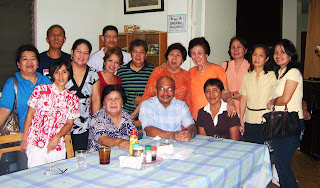1. Introduction:
One of the problems that has beset Philippine society is the land conflict:
conflict between the landlords and tenants,
conflict between large corporations and farmers who claim that they have been dispossessed,
conflict between native Lumads/Muslims and Christian settlers in Mindanao
These conflicts have often turned violent.
At present the spiral of violence has escalated in Mindanao (between the MILF and government troops) - attrocities have been committed by both sides and the collateral damage - Muslim and Christian civilians caught in the cross-fire continue to increase.
2. The Word of God
In our first reading, the prophet Isaiah reminds us that it is God who is the owner of the land, of the vineyard, and leaders and people of Israel are the tenants. The prophet denounced the leaders and people of Israel because they produced wild, sour grapes:
I looked for justice and found violence
I looked for righteousness and heard the cry of distress
According to Isaiah God was displeased by the injustice and violence. Israel failed to bring about justice and peace – a violation of the covenant.
In our Gospel today, Jesus echoes the prophet Isaiah and compared the leaders of Israel to the unproductive and murderous tenants who violently rejected the servants of the land-owner including his son.
Like the prophet Isaiah, Jesus condemned the leaders for the injustice and violence that prevailed during his time. Jesus also predicted that he would have the same fate as the prophets who were rejected by the leaders of Israel in the past.
The kingdom of God that Jesus proclaimed would be like a vineyard that will have a bountiful harvest – the kingdom where love, justice, peace and righteousness will reign.
3. Challenge for us Christians
Our readings remind us that God is the real owner of the world’s resources – the air, the seas and the land
All of us are tenants – stewards of God’s creation.
No one can claim absolute ownership of the world’s resources.
God has created of all these that all humankind – the present and future generations --will share and benefit from the bounty of creation
God expect everyone to make sure that there is a bountiful harvest that bring about progress for all – not for a few – that justice and peace will prevail
We should stop thinking about what is mine, mine, mine – rather about what is ours to share.
“there is enough for everyone’s need but not for everyone’s greed”
“I looked for justice and found bloodshed
I looked for righteousness and heard the cry of distress”
Isaiah’s lament continues today in our land.
The armed conflict continues –
between the Government and the NPA
between the Government forces and the MILF
that could turn into a conflict between Christians and Muslims
It is our duty, our responsibility as Christians to act as good tenants, good stewards and work for peace and justice, and make sure that the resources in our country will be shared by everyone – Muslims, Lumads and Christians.
This is the harvest that God – the landowner –wants from us.











